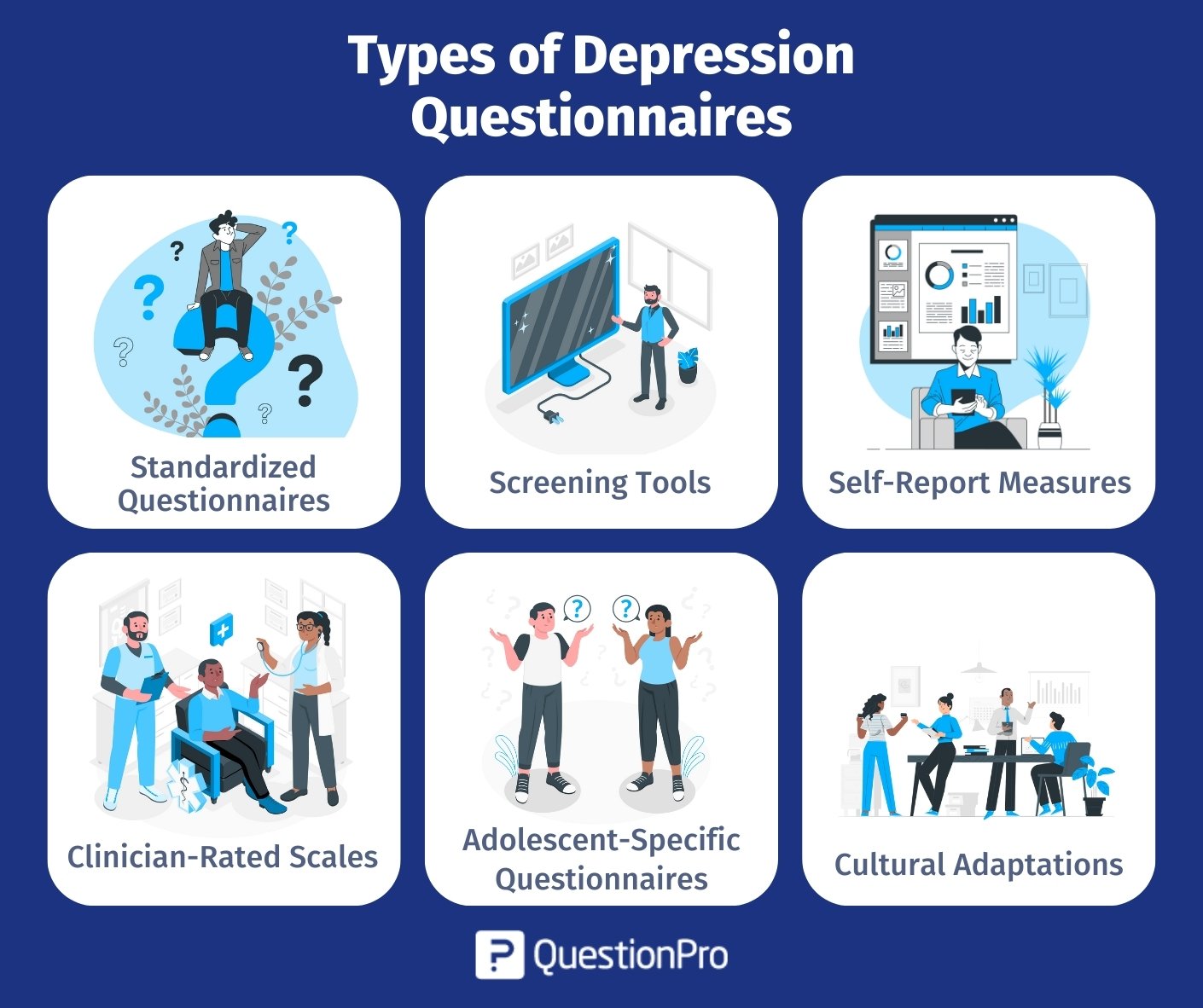
In our dynamic and demanding contemporary society, the prevalence of mental health challenges, particularly depression, has become an increasingly pressing concern affecting countless lives worldwide. Amidst this backdrop, the need for practical assessment tools to decipher the intricacies of individuals’ mental well-being has grown significantly. Enter the depression questionnaire—a vital instrument meticulously structured to unravel the emotional, cognitive, and behavioral dimensions of one’s mental landscape.
In a world where stress and uncertainties abound, the ability to comprehend and address mental health concerns has never been more critical. Depression, with its wide-ranging symptoms and varying degrees of severity, requires nuanced evaluation, making depression questionnaires an indispensable asset. This piece explores the subtle nature of these questionnaires, elucidating their role in comprehensively assessing individuals’ mental health statuses and providing invaluable insights into their emotional states.
What is Depression Questionnaire?
A depression questionnaire is a set of depression screening questions asked to gather information that will give you insights into a person’s mental health and well being. Good mental health and well being improve the quality of life.
In the current fast-paced world, stress is a major factor that is affecting people all across the globe. Major corporations have started using mindfulness and meditation techniques to reduce work stress on their employees. Depression affects people in many ways and can have various symptoms. They can range from mild to severe. Mild depression can mean you are simply feeling low in spirit, while depression severity can have fatal thoughts like being suicidal or feeling that your life has no meaning to it. There has been an increase in such cases in recent years and hence it has become quite important for detecting depression at an early stage and tackle the issue appropriately.

Examples of Severe Depression
For example, a person has been laid-off by a company and it is getting very difficult to find a new job. Because of such an incident, the individual has started feeling hopeless, has low self-esteem, and lacks sleep. Such bad times can make an individual feel they have been a failure and can cause depression severity. In such a case, a depression questionnaire can help to assess the severity of the condition and thus appropriate actions can be taken to cure depression.
Similarly, another example is a student is feeling depressed because of constant bullying, low grades, and peer pressure. In such a situation, a depression survey for students can shed some light on how severe the condition is and the facilities provided by the school/college to tackle such cases. A student interest survey helps customize teaching methods and curriculum to make learning more engaging and relevant to students’ lives. It is difficult for people to identify if the mental illness is depression or temporary sadness. You can use a free mental health survey template to identify the type of mental health care survey.
This information can help them get back to academic life and be more productive in the tasks they are required to perform.
Types of Depression Questionnaires
Understanding the diverse approaches used in assessing depression is pivotal in comprehensively evaluating mental health. Various types of depression questionnaires cater to different aspects of an individual’s mental well-being. These assessments range from standardized scales to culturally adapted tools, each offering unique insights into the complexities of depression.

Standardized Questionnaires:
These assessments, such as the Beck Depression Inventory (BDI), Patient Health Questionnaire (PHQ-9), and Hamilton Depression Rating Scale (HAM-D), employ structured questions and scoring systems to quantify the severity of depressive symptoms. They serve as standardized metrics in clinical evaluations.
Screening Tools:
Quick and targeted assessments like the PHQ-2 assist in preliminary screenings to identify individuals who may require further evaluation for depression. These concise tools play a vital role in initial assessments.
Self-Report Measures:
Tools such as the Zung Self-Rating Depression Scale depend on individuals’ self-assessments to measure their emotional state and symptomatology, providing valuable insights into their experiences.
Clinician-Rated Scales:
Utilized by healthcare professionals, clinician-rated scales like the HAM-D involve observations and assessments of patients’ symptoms, providing an expert evaluation of their depressive state.
Adolescent-Specific Questionnaires:
Tailored assessments such as the Children’s Depression Inventory (CDI) or the Mood and Feelings Questionnaire (MFQ) are designed to evaluate depression symptoms in younger populations, considering their unique developmental aspects.
Cultural Adaptations:
Adaptations and translations of questionnaires ensure inclusivity across diverse cultural backgrounds and languages, enabling accurate assessments while respecting individual differences.
These assessments consider symptoms like poor appetite, feeling tired, having little energy, and other indicators from the depression module, aiding in collaborative management and identifying individuals experiencing reduced pleasure in doing things, feeling depressed or hopeless, hurting, restless, or experiencing these symptoms on half the days.
Importance of Depression Surveys
Depression surveys serve as vital tools in the field of mental health assessment and care, providing an extensive framework for understanding and evaluating various facets of an individual’s mental and emotional well-being. They’re valuable because they systematically evaluate personal experiences and collect vital information for healthcare providers. Here are vital reasons highlighting their importance:
Early Identification and Intervention:
Depression surveys are instrumental in detecting early signs of common mental disorders by presenting a comprehensive array of questions that cover a broad spectrum of mental health concerns. These surveys encompass crucial aspects such as feeling low in energy, experiencing moderately severe symptoms, little interest or pleasure in activities, and other indicators that aid in detecting depression.
Holistic Assessment:
Structured to evaluate diverse aspects of an individual’s life affected by depression, these surveys delve into emotional well-being, behavioral patterns, cognitive functions, and physical health. They are designed to capture crucial details related to self-harm, feeling bad, trouble falling or staying asleep, and other problems associated with depression.
Personalized Treatment Plans:
The information gathered from depression surveys aids healthcare providers, especially those in general internal medicine or primary care, in formulating personalized treatment plans tailored to an individual’s specific symptoms and needs.
Monitoring Progress and Effectiveness of Treatment:
Continual assessment through follow-up depression surveys is crucial in tracking an individual’s progress during treatment, allowing for adjustments and ensuring the effectiveness of interventions.
Contribution to Research and Population Studies:
The aggregated data from depression surveys significantly contributes to research endeavors and population studies in mental health, providing valuable insights into the prevalence, trends, and impact of depression on individuals and communities.
Depression surveys play a pivotal role in early detection, personalized care, treatment monitoring, and advancing our collective understanding of depression, ensuring that healthcare providers in primary care settings have the necessary tools to detect and address depression effectively.
30 Depression survey questions for a questionnaire
Here’s how to create a good survey design for a depression questionnaire using appropriate wellness survey questions.
Depression survey questions to evaluate mental health and identify the level of depression.
Please state to your level of agreement, for the following things that have been observed in the last week
- All the tasks you have performed, are taking much more time than usual.
- Completely agree
- Somewhat agree
- Neutral
- Somewhat disagree
- Completely disagree
- You are facing a lack of concentration.
- Completely agree
- Somewhat agree
- Neutral
- Somewhat disagree
- Completely disagree
- You are feeling you have no future.
- Completely agree
- Somewhat agree
- Neutral
- Somewhat disagree
- Completely disagree
- You are facing problems with making decisions
- Completely agree
- Somewhat agree
- Neutral
- Somewhat disagree
- Completely disagree
- You feel, your life is sad, as there is no joy in your life anymore.
- Completely agree
- Somewhat agree
- Neutral
- Somewhat disagree
- Completely disagree
- You have lost interest in all things that were important to you once upon a time.
- Completely agree
- Somewhat agree
- Neutral
- Somewhat disagree
- Completely disagree
- You have been feeling guilty for everything you do.
- Completely agree
- Somewhat agree
- Neutral
- Somewhat disagree
- Completely disagree
- You have been very irritated and angry recently
- Completely agree
- Somewhat agree
- Neutral
- Somewhat disagree
- Completely disagree
- You have been feeling very fatigued
- Completely agree
- Somewhat agree
- Neutral
- Somewhat disagree
- Completely disagree
- You are feeling that everything you have done has been a failure
- Completely agree
- Somewhat agree
- Neutral
- Somewhat disagree
- Completely disagree
- You are having a lack of sleep
- Completely agree
- Somewhat agree
- Neutral
- Somewhat disagree
- Completely disagree
- You are having suicidal thoughts
- Completely agree
- Somewhat agree
- Neutral
- Somewhat disagree
- Completely disagree
- You have lost or gained weight without any diet programs.
- Completely agree
- Somewhat agree
- Neutral
- Somewhat disagree
- Completely disagree
- You are having a loss of appetite.
- Completely agree
- Somewhat agree
- Neutral
- Somewhat disagree
- Completely disagree
- You are having trust issues with everyone around you.
- Completely agree
- Somewhat agree
- Neutral
- Somewhat disagree
- Completely disagree
- You are having trouble in all your relationships (home as well as professional)
- Completely agree
- Somewhat agree
- Neutral
- Somewhat disagree
- Completely disagree
Depression questions to test an individual’s knowledge about depression (Used to test the knowledge of new doctors)
- A patient has 4 symptoms of depression. What do you think about the severity of his condition?
- Not depressed
- Mild depression
- Moderate depression
- Severe depression
- A patient is feeling irritated, has poor concentration, sleeping difficulties, and feelings of guilt which suggest mild depression. What do you think the doctor should do?
- Prescribe an antidepressant
- Prescribe venlafaxine
- Advise self-help or psychological intervention
- Advise psychological intervention along with SSRI.
- If a person is suffering from moderate depression and is also suffering from a pre-existing heart disease, which SSRI should not be prescribed?
- Paroxetine
- Fluvoxamine
- Venlafaxine
- Mirtazapine
- A patient goes to a doctor for surgery but is also suffering from anxiety as well as depression. Do you think the doctor should treat depression first?
- Completely agree
- Somewhat agree
- Neutral
- Somewhat disagree
- Completely disagree
- Don’t know
- A patient is suffering from severe depression. What course of treatment should be prescribed to them?
- Antidepressants
- CBT
- A combination of CBT and Antidepressants
- Other psychological therapies
- In your words, please elaborate on the step care model for depression and what it does? (Open-ended question)
- A patient has harmed themselves, and is having feelings of guilt, worthlessness, is very self-critical and is also suffering from fatigue. To what level do you agree the treatment should be a tricyclic antidepressant.
- Completely agree
- Somewhat agree
- Neutral
- Somewhat disagree
- Completely disagree
- Don’t know
- Do you think the first episode of moderate depression should be treated with a high dose of SSRI to quickly resolve the issue?
- Completely agree
- Somewhat agree
- Neutral
- Somewhat disagree
- Completely disagree
- Don’t know
- A patient is diagnosed with a panic disorder. Which of the following treatments should not be prescribed for Panic disorder?
- Imipramine
- Benzodiazepines
- Sedating antihistamines
- Clomipramine
- Antipsychotics
- A person has recently started feeling low, crying and is always tired. Over a period of time, there is an insignificant improvement. What level of depression would you diagnose?
- Minor
- Mild
- Moderate
- Dysthymia
- A patient is suffering from chronic severe depression and is referred to a mental health specialist along with a prescription for Venlafaxine. What should be considered when prescribing Venlafaxine? (multiple choice question)
- Addiction
- Increased likelihood of patient stopping treatment because of side effects
- Withdrawal symptoms
- Toxicity in overdose
- Do you think the dose for a patient who has been prescribed with Seroxat can be tapered as his treatment is coming to an end?
- Completely agree
- Somewhat agree
- Neutral
- Somewhat disagree
- Completely disagree
- Don’t know
- A person is suffering from severe depression and is also associated with cardiovascular disease? What treatments pose a high risk for such a patient?
- SSRI’s
- Tricyclic antidepressants
- Course of Venlafaxine
- Do you have any comments/suggestions regarding improvement in depression treatment?
The above questions are used by depression specialists to test the knowledge of new doctors. Such questions are very specific and can be understood by medical professionals only.
Conclusion
Depression questionnaires are fundamental tools in modern mental health practices, serving as an initial step in identifying, evaluating, and addressing the intricate spectrum of depressive symptoms individuals may encounter. They encompass various indicators such as the depression severity measure, trouble concentrating, interest levels, fatigue, and other vital markers. These questionnaires establish a structured framework for assessing emotional, cognitive, and behavioral aspects, aiding in evaluating mental health status comprehensively.
Beyond assessment, these questionnaires hold significant value in destigmatizing mental health conversations. They shine a light on critical elements like depression severity, trouble concentrating, reduced interest in activities, persistent fatigue, and more. Doing so encourages open dialogues about emotional well-being, empowering individuals to articulate their challenges and facilitating early intervention. As mental health awareness progresses, these tools remain pivotal in recognizing and supporting individuals grappling with depression, equipping healthcare providers with valuable insights like trouble falling.
Among these questionnaires, the brief depression severity measure and the PHQ-9 are notable instruments. They gauge vital aspects such as little interest, concentration difficulties, and severity of depressive symptoms, contributing significantly to the overall understanding and management of depression. These tools play a crucial role in the ongoing efforts to identify and assist individuals dealing with depression, ensuring that healthcare providers have essential insights for practical support and intervention strategies.







